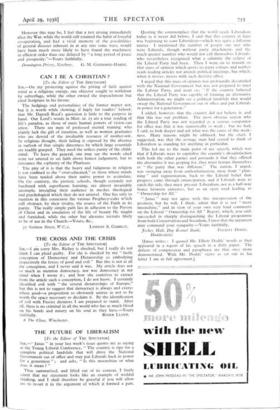[To the Editor of THE SPECTATOR] SIR,—On my protesting against
the pitting of faith against mind as a religious energy, one objector sought to withdraw by subterfuge, while the other owned the impeachment but cited Scripture in his favour.
The hedgings and personalities of the former matter not, but it is worth while showing, if haply for readers' behoof, that Mr. Dayrell Reed's quotation is little to the purpose in hand. Our Lord's words in Matt. xi. 25 are a true reading of life's paradox, as those of mere human powers of vision can attest. There are men of professed mental training who plainly lack the gift of intuition, as well as women graduates who are devoid of the invaluable resource of mother-wit. In religious thought, their failing is exposed by the absence in outlook of that simple directness by which large essentials are readily grasped. They need the artless purity of the child- mind. To leave the general, one may say the words cited were not uttered to set faith above honest judgement, but to denounce the sophistry of the Pharisees.
' The pity of it is that the heavy and fuliginous in religion is rot confined to the "over-educated," or those whose minds have been tended above their native power to assimilate. On the contrary, the pietistic schools, though certainly not .burdened with superfluous learning, are almost invariably .unsimple, inveigling their audience in meshes theological .and psychological which they do not unravel. One has only to mention in this connexion the various Prophecy-cults which still obstruct, by their rivalry, the course of the Faith in its purity. The really simple path lies in adhesion to the Person of Christ and in emulation of the life of beauty He taught and furnished, while the other but alienates recruits likely to be of use in the Church.—Yours, &c.,


























































 Previous page
Previous page